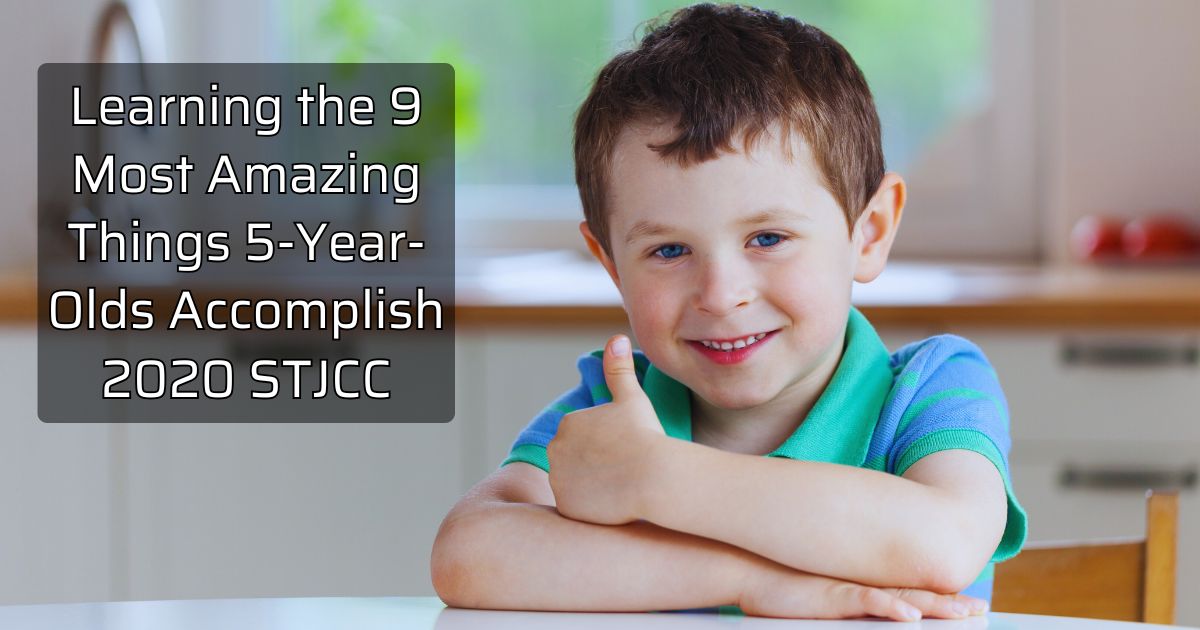The early childhood years are marked by rapid development and extraordinary milestones. By the age of five, children accomplish various achievements that shape their future academic and emotional well-being. Understanding these milestones is essential for parents, caregivers, and educators to provide the necessary support for children as they grow. In this article, we will explore learning the 9 most amazing things 5-year-olds accomplish 2020 STJCC, emphasizing the key milestones that make five-year-olds uniquely capable and ready to take on new challenges.
Introduction: The Importance of Early Childhood Milestones
At five years old, children undergo dramatic transformations, making strides in their cognitive, emotional, and social development. These milestones, which occur at such a young age, are essential for setting the stage for their future success. Notably, these early achievements help children develop the skills they need for school and for life. Thus, understanding the learning the 9 most amazing things 5-year-olds accomplish 2020 STJCC is crucial, as it allows parents to offer the appropriate environment and experiences to nurture these developments.
Mastering Early Literacy: Recognizing Sight Words and Simple Reading
One of the most significant accomplishments at this age is the development of basic literacy. By five, children often begin recognizing sight words and reading simple sentences. This progression not only marks a critical academic milestone but also sets the foundation for their future learning. For instance, children who are introduced to books early on tend to have a stronger vocabulary and better comprehension skills as they grow. Moreover, engaging children in reading aloud can further foster their love for learning, ensuring they develop early literacy skills that will serve them throughout their lives.
Building Basic Math Skills: Counting, Addition, and Subtraction
In addition to literacy, five-year-olds also start developing basic math skills. At this stage, children are learning to count, recognize numbers, and solve simple addition and subtraction problems. This early grasp of numeracy helps children think logically and enhances their problem-solving skills. Furthermore, integrating math into everyday activities—such as counting objects during play or sharing toys—can make learning enjoyable. Thus, learning the 9 most amazing things 5-year-olds accomplish 2020 STJCC stresses the importance of math development, as these early skills lay the groundwork for later academic success in subjects like science and engineering.
Developing Fine and Gross Motor Skills: Coordination and Physical Activities
Physical development is another area where five-year-olds see remarkable progress. They begin to refine both their fine and gross motor skills, which are essential for everyday tasks. Fine motor skills, such as holding a pencil or using scissors, improve, while gross motor skills like running, jumping, and balancing also develop significantly. These physical milestones help children gain confidence in their bodies, contributing to a sense of independence. Moreover, encouraging physical activities—whether it’s through sports or outdoor games—supports both their physical health and emotional well-being. Therefore, nurturing physical skills is vital at this stage of development.
Also Read: Rifle Barrel 32.7 x 42 1:20
The Role of Imaginative Play: Creativity and Cognitive Growth
In addition to academic and physical milestones, imaginative play plays a pivotal role in the development of creativity and cognitive growth. At five, children engage in more complex pretend play, often acting out scenarios with peers. This imaginative play encourages problem-solving, creativity, and emotional expression. Additionally, through role-playing, children learn to understand different perspectives, which enhances their social skills and empathy. As highlighted in learning the 9 most amazing things 5-year-olds accomplish 2020 STJCC, parents and caregivers can encourage this development by providing opportunities for children to explore their imagination through arts and crafts, storytelling, and dress-up games.
Improved Social Skills: Building Friendships and Emotional Intelligence
At age five, children start to establish deeper friendships and refine their social skills. They learn to share, take turns, and work cooperatively with others. These interactions are fundamental for emotional growth. Socializing with peers allows children to develop empathy and the ability to navigate complex emotions. As a result, they begin to understand concepts like fairness and kindness. Consequently, parents can help foster these skills by encouraging group activities and playdates. In doing so, children learn to manage conflicts and develop lasting emotional intelligence, which will be essential as they transition to school environments.
Independence and Responsibility: Encouraging Self-Sufficiency
As children approach their fifth year, they begin to demonstrate a growing desire for independence. They become more capable of completing simple tasks, such as dressing themselves, setting the table, and feeding pets. This increased sense of responsibility boosts self-confidence and helps them develop autonomy. Furthermore, these experiences teach children the value of personal responsibility, helping them to become more self-sufficient. Therefore, by encouraging them to take on small household tasks, parents can help children feel proud of their accomplishments and cultivate a sense of responsibility.
Emotional Regulation: Expressing and Managing Emotions
At five years old, children also begin to understand and regulate their emotions more effectively. They learn to name their feelings and express them in appropriate ways, reducing the frequency of tantrums or emotional outbursts. This ability to manage emotions is crucial for building positive relationships with peers and adults. Parents can help by creating a supportive environment where children feel comfortable expressing themselves. Moreover, activities like reading books about emotions or practicing mindfulness can enhance emotional awareness and self-regulation. Thus, supporting emotional development at this stage is key for children’s overall well-being.
Curiosity and Exploration: The ‘Why’ Stage
At this age, children become incredibly curious, asking endless questions to understand the world around them. Whether they ask about why the sky is blue or how plants grow, their curiosity drives them to explore and learn. This insatiable thirst for knowledge encourages cognitive growth and fosters a deeper understanding of their surroundings. To support this curiosity, parents can offer new experiences and encourage exploration through hands-on activities like science experiments, nature walks, and visits to museums. By nurturing this natural curiosity, children will continue to develop their critical thinking and problem-solving skills.
Conclusion
In conclusion, the milestones that five-year-olds reach by 2020 are truly remarkable. From mastering basic literacy and math skills to improving their social and emotional intelligence, these accomplishments lay the foundation for their future success. Parents and caregivers play an integral role in supporting these milestones by creating a nurturing environment that fosters curiosity, independence, and emotional regulation. As we’ve seen in learning the 9 most amazing things 5-year-olds accomplish 2020 STJCC, these early years are critical in shaping who children become, and by providing the right support, we can help them reach their full potential.










